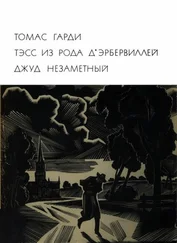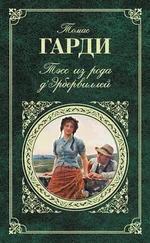| There was a momentary pause; it was broken, first, in one little tentative note; then a second voice strengthened it, and a third and a fourth chimed in unison, with words they had learnt at the Sunday-school- Here we suffer grief and pain, Here we meet to part again; In Heaven we part no more. |
Минутное молчание было нарушено слабым голоском, к которому присоединился второй, третий, четвертый, они запели гимн, заученный в воскресной школе: □ □ Здесь терпим мы муку и боль, □□Здесь, встретясь, должны мы расстаться;□ □Но в раю не бывает разлуки. |
| The four sang on with the phlegmatic passivity of persons who had long ago settled the question, and there being no mistake about it, felt that further thought was not required. |
Все четверо пели равнодушно - так, как будто этот вопрос был решен для них давным-давно и окончательно, а следовательно, и думать о нем нечего. |
| With features strained hard to enunciate the syllables they continued to regard the centre of the flickering fire, the notes of the youngest straying over into the pauses of the rest. |
Их личики были серьезны, они старались отчетливо выговаривать слова и не сводили глаз с колеблющихся языков пламени; голос младшего ребенка еще звучал, когда остальные делали паузу. |
| Tess turned from them, and went to the window again. |
Тэсс отвернулась от них и снова подошла к окну. |
| Darkness had now fallen without, but she put her face to the pane as though to peer into the gloom. |
Было уже совсем темно, но она прижалась лицом к стеклу, словно всматриваясь в ночь. |
| It was really to hide her tears. |
На самом деле она хотела скрыть слезы. |
| If she could only believe what the children were singing; if she were only sure, how different all would now be; how confidently she would leave them to Providence and their future kingdom! |
Если бы она могла верить в то, о чем пели дети, если бы не возникали у нее сомнения, все было бы иначе. С каким спокойствием поручила бы она детей провидению в надежде на будущую жизнь! |
| But, in default of that, it behoved her to do something; to be their Providence; for to Tess, as to not a few millions of others, there was ghastly satire in the poet's lines- Not in utter nakedness But trailing clouds of glory do we come. |
Но веры у нее не было: стало быть, она должна что-то делать, должна стать их провидением, ибо для Тэсс, как и для миллионов людей, жестокой насмешкой звучали слова поэта: □ □Не нагими приходим мы в мир, □ □Но облаченные в облако славы. |
| To her and her like, birth itself was an ordeal of degrading personal compulsion, whose gratuitousness nothing in the result seemed to justify, and at best could only palliate. |
Для нее и ей подобных самый факт рождения являлся унизительным испытанием, насилием, которое до конца оставалось неоправданным или в лучшем случае оправдывалось лишь частично. |
| In the shades of the wet road she soon discerned her mother with tall 'Liza-Lu and Abraham. |
Вскоре она разглядела на темной мокрой дороге свою мать, рослую Лизу Лу и Абрэхэма. |
| Mrs Durbeyfield's pattens clicked up to the door, and Tess opened it. |
Миссис Дарбейфилд, постукивая патенами, подошла к дому, и Тэсс открыла дверь. |
| "I see the tracks of a horse outside the window," said Joan. |
- Я заметила следы лошадиных копыт под окном, - сказала Джоан. |
| "Hev somebody called?" |
- Кто-нибудь заходил? |
| "No," said Tess. |
- Нет, - ответила Тэсс. |
| The children by the fire looked gravely at her, and one murmured-" Why, Tess, the gentleman a-horseback!" |
Дети, сидевшие возле очага, посмотрели на нее серьезно, и один из них прошептал: - Что ты, Тэсс? А джентльмен верхом? |
| "He didn't call," said Tess. |
- Он не заходил в дом, - сказала Тэсс. |
| "He spoke to me in passing." |
- Он разговаривал со мной, не сходя с лошади. |
| "Who was the gentleman?" asked the mother. |
- А кто это был? - спросила мать. |
| "Your husband?" |
- Твой муж? |
| "No. |
- Нет. |
| He'll never, never come," answered Tess in stony hopelessness. |
Он ко мне никогда, никогда не приедет, - ответила Тэсс с какой-то тупой безнадежностью. |
| "Then who was it?" |
-Так кто же это был? |
| "Oh, you needn't ask. |
- Не спрашивай. |
| You've seen him before, and so have I." |
Ты его раньше видела, да и я тоже. |
| "Ah! |
-А! |
| What did he say?" said Joan curiously. |
Что же он сказал? - с интересом спросила Джоан. |
| "I will tell you when we are settled in our lodging at Kingsbere to-morrow-every word." |
- Я расскажу тебе завтра, когда мы устроимся на новой квартире в Кингсбире, расскажу все до последнего слова. |
| It was not her husband, she had said. Yet a consciousness that in a physical sense this man alone was her husband seemed to weigh on her more and more. |
- Она сказала, что это был не ее муж, - однако ее все более угнетала мысль, что фактически только он один и был ее мужем. |
| LII |
52 |
| During the small hours of the next morning, while it was still dark, dwellers near the highways were conscious of a disturbance of their night's rest by rumbling noises, intermittently continuing till daylight-noises as certain to recur in this particular first week of the month as the voice of the cuckoo in the third week of the same. |
Было еще темно, когда обитатели домиков, расположенных неподалеку от проезжей дороги, были разбужены стуком и грохотом, не смолкавшими до рассвета, - шум этот повторялся ежегодно в эти числа месяца и был так же неизбежен, как кукование кукушки на третью неделю того же месяца. |
| They were the preliminaries of the general removal, the passing of the empty waggons and teams to fetch the goods of the migrating families; for it was always by the vehicle of the farmer who required his services that the hired man was conveyed to his destination. |
Он предвещал общее переселение; по дорогам двигались пустые повозки и подводы, присланные за пожитками уезжающих семейств: обычай требовал, чтобы фермеры, нанявшие батраков, присылали за ними подводу. |
| That this might be accomplished within the day was the explanation of the reverberation occurring so soon after midnight, the aim of the carters being to reach the door of the outgoing households by six o'clock, when the loading of their movables at once began. |
Вещи нужно было засветло перевезти на место -вот почему подводы грохотали по дорогам в глухую ночь: в шесть часов утра им следовало быть у дверей переезжающих, и тут же начиналась погрузка. |
| But to Tess and her mother's household no such anxious farmer sent his team. |
Но ни один заботливый фермер не выслал повозки за вещами Тэсс и ее матери. |
| They were only women; they were not regular labourers; they were not particularly required anywhere; hence they had to hire a waggon at their own expense, and got nothing sent gratuitously. |
Они не были батраками, в их услугах никто не нуждался, никто не намерен был перевозить их даром, поэтому им пришлось за свой счет нанять подводу. |
| It was a relief to Tess, when she looked out of the window that morning, to find that though the weather was windy and louring, it did not rain, and that the waggon had come. |
Выглянув в то утро из окна, Тэсс вздохнула с облегчением, когда увидела, что дождя нет, хотя погода ветреная и пасмурная, и что подвода явилась вовремя. |

![Томас Вулф - Взгляни на дом свой, ангел [английский и русский параллельные тексты]](/books/32195/tomas-vulf-vzglyani-na-dom-svoj-angel-anglijskij-thumb.webp)
![Агата Кристи - На краю [английский и русский параллельные тексты]](/books/32247/agata-kristi-na-krayu-anglijskij-i-russkij-paralle-thumb.webp)
![Сакс Ромер - Ведьмино отродье [английский и русский параллельные тексты]](/books/33237/saks-romer-vedmino-otrode-anglijskij-i-russkij-thumb.webp)
![Агата Кристи - Объявлено убийство [английский и русский параллельные тексты]](/books/33247/agata-kristi-obyavleno-ubijstvo-anglijskij-i-russ-thumb.webp)
![Фрэнсис Фицджеральд - По эту сторону рая [английский и русский параллельные тексты]](/books/34130/frensis-ficdzherald-po-etu-storonu-raya-anglijskij-thumb.webp)

